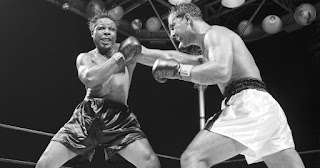by A.J. Liebling
USA, 1956
It is through Jack O'Brien, the Arbiter Elegantiarum Philadelphiae, that I trace my rapport with the historic past through the laying-on of hands. He hit me, for pedagogical example, and he had been hit by the great Bob Fitzsimmons, from whom he won the light-heavyweight title in 1906. Jack had a scar to show for it. Fitzsimmons had been hit by Corbett, Corbett by John L. Sullivan, he by Paddy Ryan, with the bare knuckles, and Ryan by Joe Goss, his predecessor, who as a young man had felt the fist of the great Jem Mace. It is a great thrill to feel that all that separates you from the early Victorians is a series of punches on the nose. I wonder if Professor Toynbee is as intimately attuned to his sources. The Sweet Science is joined onto the past like a man's arm to his shoulder.
(The Sweet Science, 5)
It's a pleasure to end the blogging year with A.J. Liebling's The Sweet Science, easily the funniest book I read in all of 2019 and a volume imbued with passion for and knowledge about its subject: the world of boxing and all those who are associated with it. For those so inclined, it's easy to surrender to the fight reporter's charms: boxing analysis, ring history, great anecdote after great anecdote, and of course jeers overheard in the crowd all unfurl in a Bayeux tapestry of crackerjack prose and vintage smack talk. For example, how could you not have a good time when confronted with Chandleresque quips like this one about the ex-featherweight champ Abe Attell and then trainer for Rocky Marciano, "who looks at you with cold eyes around his huge beak that is like a toucan's with a twisted septum" (34) or this one which harpoons M.B.A. publicity director Maurie Waxman as "a hyperthyroid fellow who is happiest when strangling with rage" (142-143) or this nugget about Archie Moore and a tough Madison Square Garden opponent--"Both fighters looked tired, but Moore looked mean-tired behind his whiskers, like Mephistopheles on a hot night" (160)? Impossible! Similarly, it was difficult not to thrill to Liebling's running gag about boxing writing legend Pierce Egan (1772-1849), blandly championed as "the greatest writer about the ring who ever lived" early on (10) and then waggishly celebrated as "the Froissart of the London prize ring" (89), "the Sire de Joinville of the London prize ring" (94) and "the Edward Gibbon and Sir Thomas Malory of the old London prize ring" (211) at regular intervals throughout (for variation, Egan's magazine gets its own homage from the respectful Liebling, 1904-1963, on page 135: "I quote from Boxiana, the Mille et Une Nuits of the London prize ring"). Of course, for those looking for heavyweight punching power rather than these style points of the jab, The Sweet Science also has some memorable bits on the psychology of fandom ("When Louis knocked Savold out, I came away singularly revived--as if I, rather than Louis, had demonstrated resistance to the erosion of time. As long as Joe could get by, I felt, I had a link with an era when we were both a lot younger. Only the great champions give their fellow citizens time to feel that way about them, because only the great ones win the title young and hold on to it" [26]) and, speaking about the erosion of time, a superb closing piece pitting Archie Moore and Rocky Marciano as the Ahab and Nemesis of '50s ring culture in which Camus, Melville, and Marciano's "natural prehistoric style" (212-213) all have a part to play in the elegant Moore's mini-tragedy underneath the lights at the old Yankee Stadium. Loved this book. Look forward to revisiting it down the road.
Marciano vs. Moore, 1955
Quotes from Liebling's personality-laden The Sweet Science come from The Sweet Science and Other Writings (New York: The Library of America, 2009, 1-225).
Quotes from Liebling's personality-laden The Sweet Science come from The Sweet Science and Other Writings (New York: The Library of America, 2009, 1-225).



























